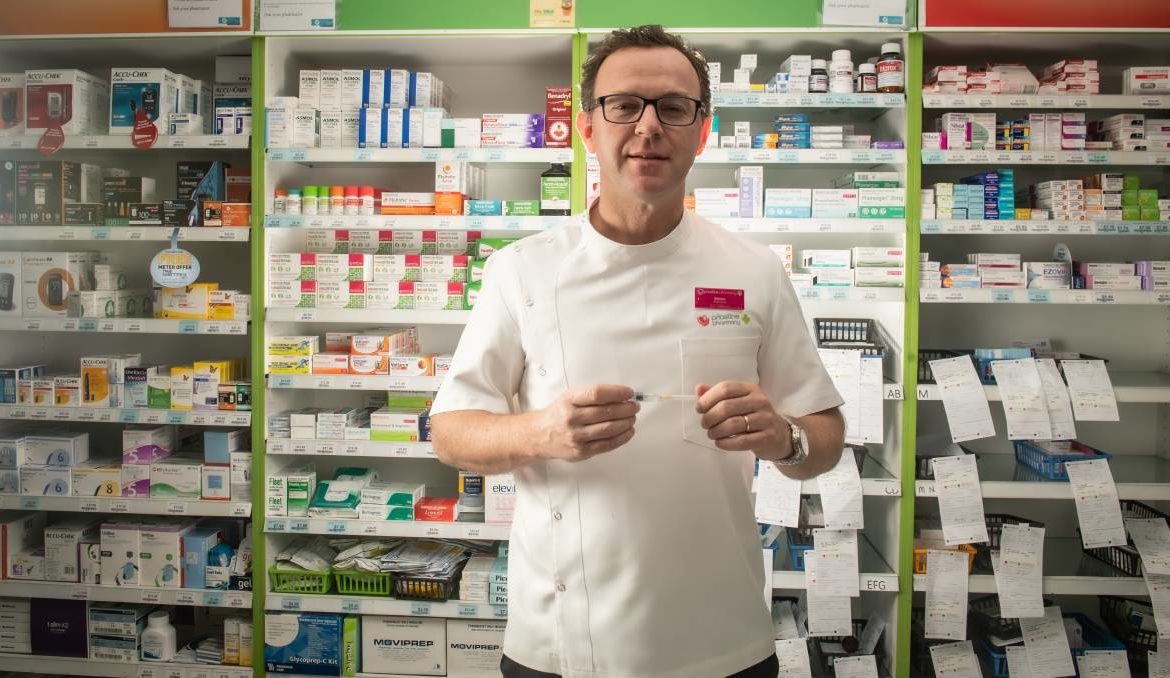news, act-politics,
Canberra Hospital will likely be the first site the COVID-19 vaccine will be administered at in the ACT, with the national rollout expected to begin next month. General practitioners and pharmacies will likely play a role in the later expansion of the vaccine across the broader population. The Pfizer vaccine will be the first vaccine to be rolled out in Australia and needs to be stored at minus 70 degrees Celsius. This means its delivery will be centred around hospitals where specialised freezers are located. Chief Minister Andrew Barr said it was most likely going to be delivered from Canberra Hospital. AstraZeneca’s vaccine is set to be rolled out a few weeks later and can be stored, transported and handled at normal refrigerated conditions, so will be able to be administered at other sites. “The AstraZeneca vaccine which does not need cold chain storage is the one more likely to service regional areas,” Mr Barr said. “It remains to be seen exactly the balance between the two [vaccines] and the timing of their rollout for the different phases.” The vaccines will be rolled out across the population through five different phases. The first – to begin as early as next month – will include front-line health workers, aged care and workers and residents, and those living with a disability or working in the sector. Australian Medical Association ACT president Antonio Di Dio said it would be a logistical challenge to vaccinate the population. He said he imagined established sites, like the temporary surge centre opposite Canberra Hospital and the EPIC drive-through testing centre, could be used as major vaccination centres. As the rollout progresses, vaccines would be more likely to be administered at smaller general practices. Pharmacy Guild of Australia ACT branch president Simon Blacker said community pharmacists in the territory and across the country were keen to be involved in the rollout where required. “We’d like to think that when our workforce is vaccinated we’d be able to help with the general public,” he said. He said community pharmacists’ role would most likely come at the later stages of the rollout, when the greater population was getting vaccinated. “In Australia we’re in a privileged position to be able to learn from around the world,” he said. “As we get more data on what’s going with the vaccination overseas, we’ll have more clarity about what may happen down the track.” READ MORE: He said close to 60 million injections across the country would need to be given throughout the year, when the season flu vaccine was also taken into account. “Many hands make light work,” Mr Blacker said. “If GPs were focussed on the COVID vaccine rollout we’d be there to help with the flu shots.” He said pharmacists were in discussion with the ACT government to legislate to allow them to administer a COVID-19 vaccine. About two-thirds of Canberra’s community pharmacies currently administer vaccines.
/images/transform/v1/crop/frm/uKjMY4e5Mbar2wCa46ayu4/394e9767-091c-435a-992d-547e3a04fac6.jpg/r14_47_5311_3040_w1200_h678_fmax.jpg
Canberra Hospital will likely be the first site the COVID-19 vaccine will be administered at in the ACT, with the national rollout expected to begin next month.
General practitioners and pharmacies will likely play a role in the later expansion of the vaccine across the broader population.
The Pfizer vaccine will be the first vaccine to be rolled out in Australia and needs to be stored at minus 70 degrees Celsius.
This means its delivery will be centred around hospitals where specialised freezers are located.
Chief Minister Andrew Barr said it was most likely going to be delivered from Canberra Hospital.
AstraZeneca’s vaccine is set to be rolled out a few weeks later and can be stored, transported and handled at normal refrigerated conditions, so will be able to be administered at other sites.
“The AstraZeneca vaccine which does not need cold chain storage is the one more likely to service regional areas,” Mr Barr said.
“It remains to be seen exactly the balance between the two [vaccines] and the timing of their rollout for the different phases.”
The vaccines will be rolled out across the population through five different phases.
The first – to begin as early as next month – will include front-line health workers, aged care and workers and residents, and those living with a disability or working in the sector.
Australian Medical Association ACT president Antonio Di Dio said it would be a logistical challenge to vaccinate the population.
He said he imagined established sites, like the temporary surge centre opposite Canberra Hospital and the EPIC drive-through testing centre, could be used as major vaccination centres.
As the rollout progresses, vaccines would be more likely to be administered at smaller general practices.
Pharmacy Guild of Australia ACT branch president Simon Blacker said community pharmacists in the territory and across the country were keen to be involved in the rollout where required.
“We’d like to think that when our workforce is vaccinated we’d be able to help with the general public,” he said.
He said community pharmacists’ role would most likely come at the later stages of the rollout, when the greater population was getting vaccinated.
“In Australia we’re in a privileged position to be able to learn from around the world,” he said.
“As we get more data on what’s going with the vaccination overseas, we’ll have more clarity about what may happen down the track.”
He said close to 60 million injections across the country would need to be given throughout the year, when the season flu vaccine was also taken into account.
“Many hands make light work,” Mr Blacker said.
“If GPs were focussed on the COVID vaccine rollout we’d be there to help with the flu shots.”
He said pharmacists were in discussion with the ACT government to legislate to allow them to administer a COVID-19 vaccine.
About two-thirds of Canberra’s community pharmacies currently administer vaccines.







